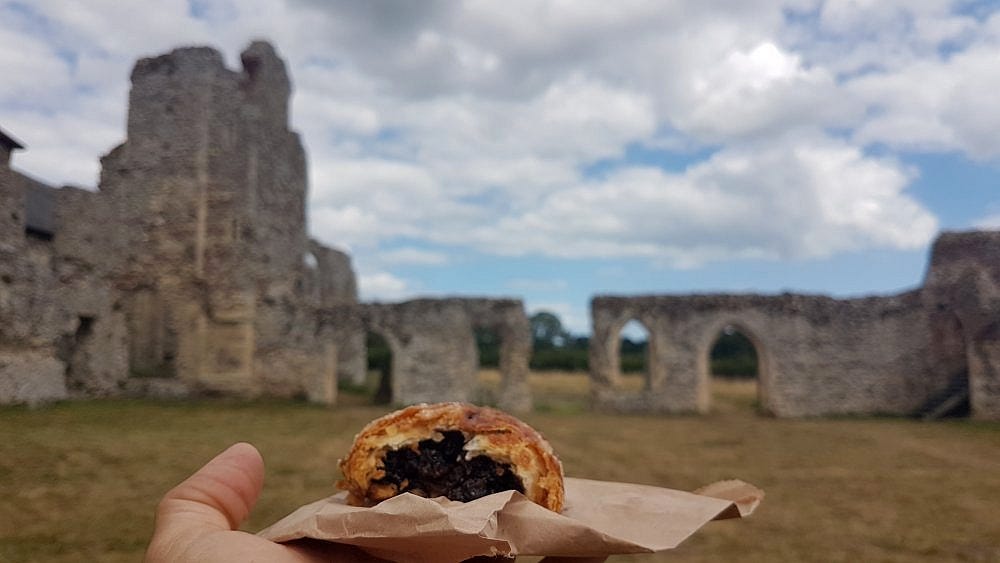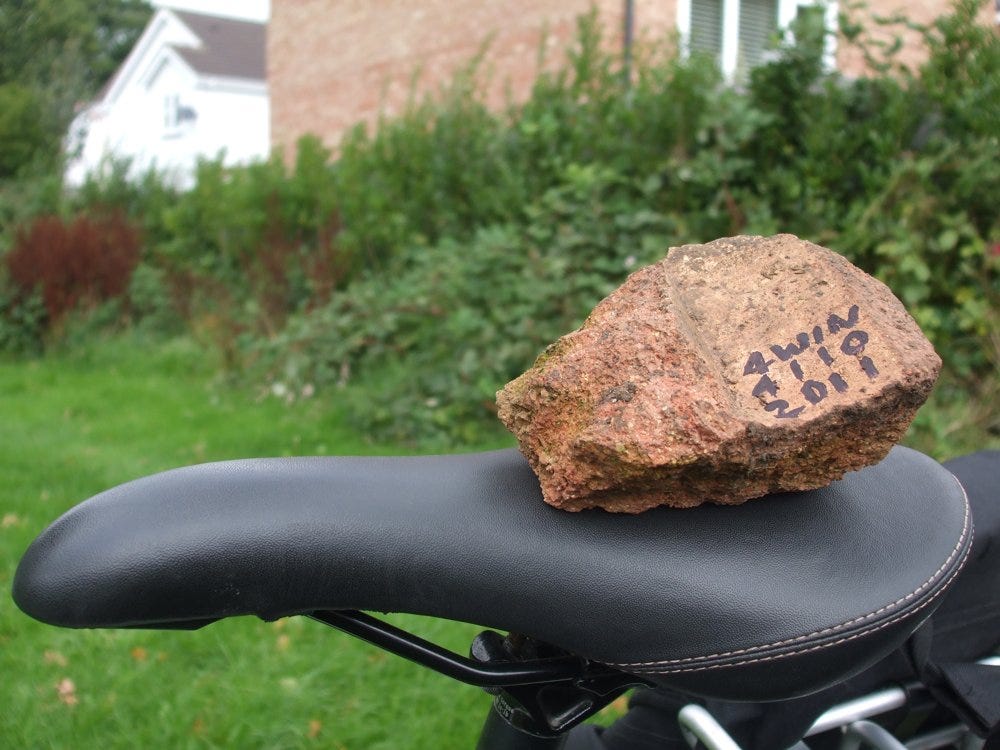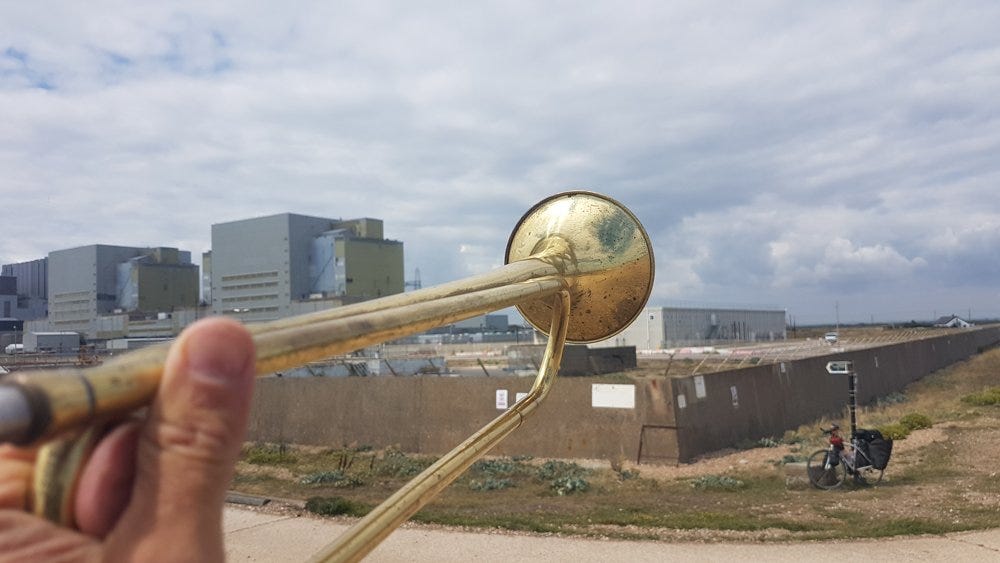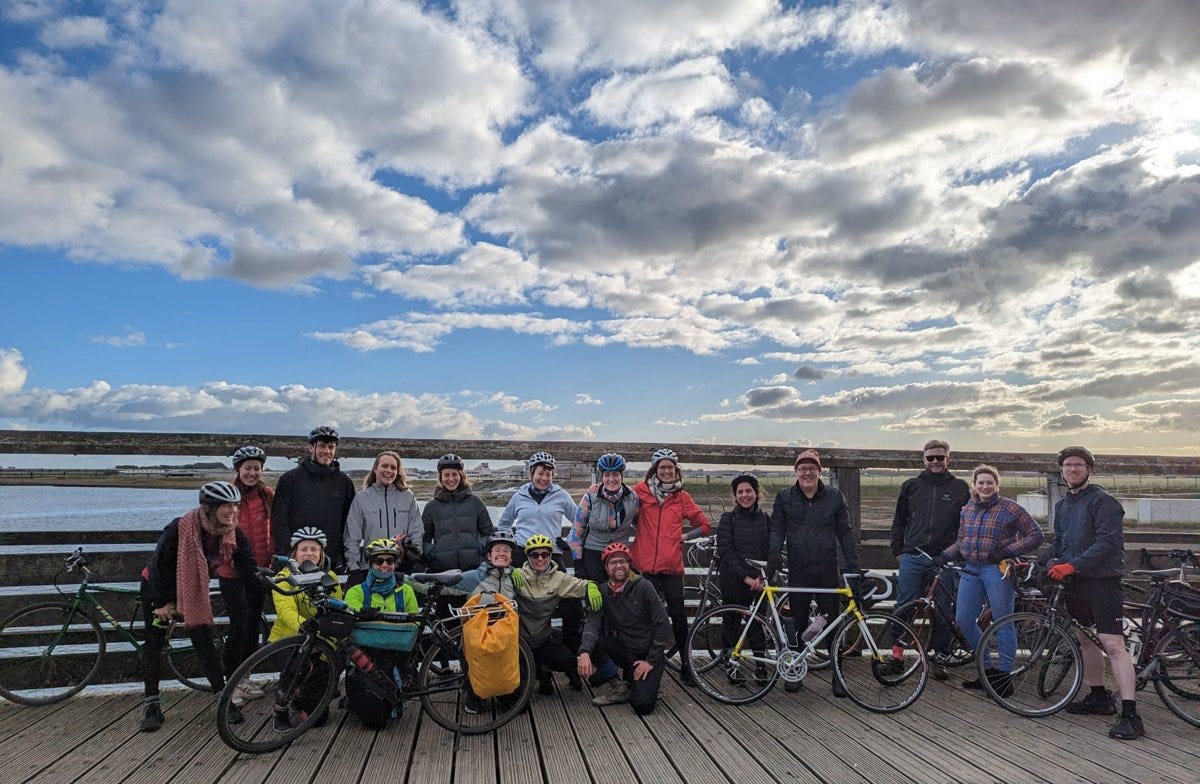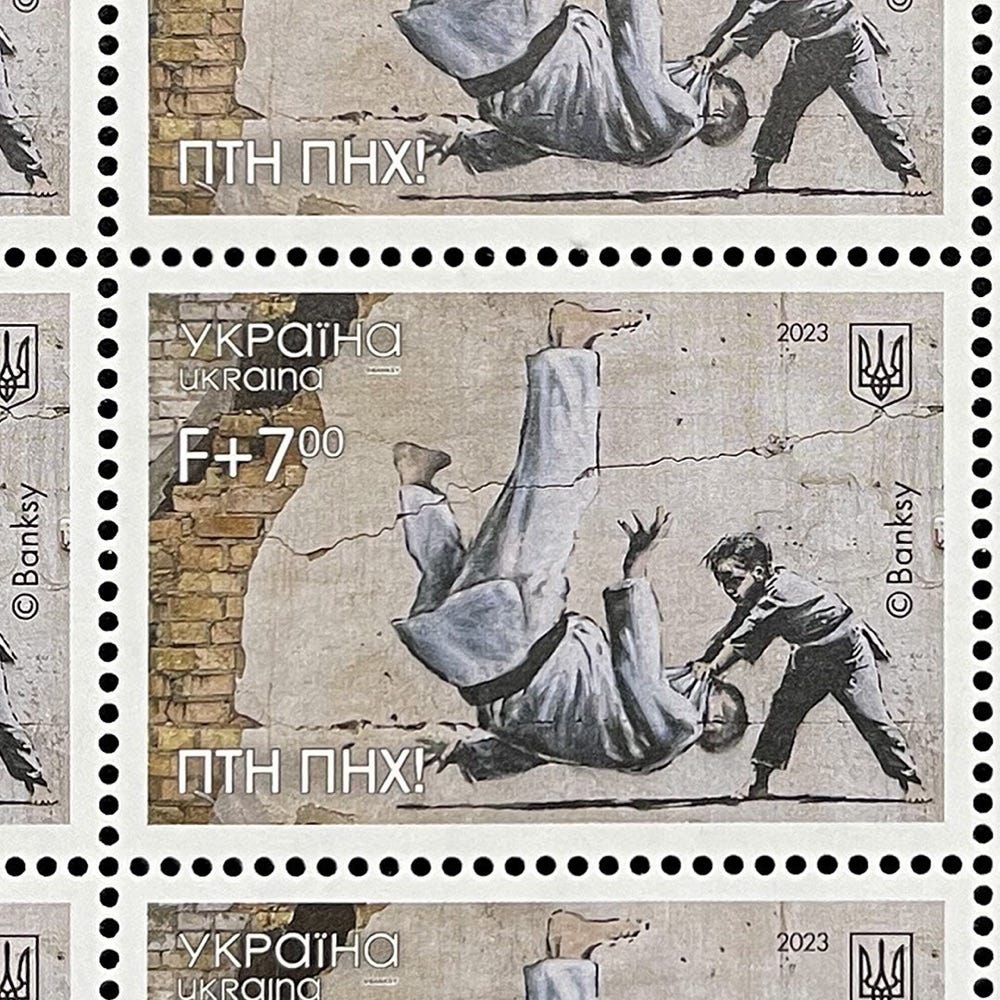Coasting In Public
A previous iteration of David Charles would have felt threatened by this man’s speech and seen this fellow sauna dweller as an enemy to be fought and defeated
Happy Friday!
And a warm welcome from a post-commuter train to London, on this, a day of friendship and love.
Thanks to everyone who shared and messaged about last week’s story, The End Of Doomspreading — it’s already my sixth most-read edition of this newsletter.
My drive is to help us develop more effective ways of connecting with people who start on the other side of an apparently deep divide and turn difficult conversations into connective conversations — like the one I had in the sauna yesterday.
One of the regulars had asked me about Thighs of Steel and so I was telling them a bit about what we do in solidarity with people on the move.
From the other side of the bench, another man piped up: ‘I don’t think you’ll get many people who disagree with immigration in theory,’ he said, ‘at least, not for people who are here to work hard and contribute to the economy.
‘But why does the government spend seven million pounds a day putting asylum seekers with no qualifications and no job in four and five star hotels — and giving them a phone, phone credit and fifty quid a week pocket money, to boot?’
A previous iteration of David Charles would have felt threatened by this man’s speech.
A previous iteration would have seen this fellow sauna dweller as an enemy to be fought and defeated. A previous iteration might have fired back what this man had missed: the cold realities of living in the UK as an asylum seeker.
Alternatively, a previous iteration might have felt angry, so angry that I might have spent the rest of my sauna time simmering in outrage, completely incapable of forming a coherent response until much later. We’ve all been there.
But yesterday, I was curious.
I could tell that the man was doomspreading and doomsplaining: not only passing on ‘the world’s all going to shit’ propaganda that he’d swallowed, but also pushing his pessimistic moral opinion that there are deserving and undeserving human beings.
Because I recognised that he was doomspeaking, I knew that this man needed empathy, not argument.
So I listened for the underlying fears and emotions. What I heard was confused resentment, fuelled by a deep sense of injustice.
I also hate injustice so it was easy to empathise, not with the content of what he was saying, but with his emotion of confused resentment and his unmet need for justice.
Although we only had a few minutes before I fainted from heat exhaustion, we quickly found some common ground.
‘If they’ve got all this money lying around for five star hotels,’ the man said, ‘why don’t they look after the people who are already here, instead of giving it to people who just arrived?
‘Why don’t they use it to end homelessness?’
Zing! Why not, indeed?
From our opening statements, this man and I were apparently entrenched on opposite precipices of a gas-powered flaming canyon, where even a single step towards each other would get us burned alive.
But now I can see how easily we could work together on something we both believe in.
Even if we radically disagree on freedom of movement (at one point he suggested that the government should’ve bought up all the decommissioned cruise liners to keep refugees offshore), he urgently wants to end homelessness.
I can get with that, so that’s where we can start.
(I won’t mention quite yet that close to half of rough sleepers in London are not from the UK and that our asylum system and destitution are not as independent as he might imagine.)
Funnily enough, Dan Sumption (of pithy newsletter fame) told me he had an almost identical conversation about migration this week as well.
I hope you’re also having these conversations and I hope that the idea of doomspeech helps you make such connections about more than argument and antagonism.
For those of you new to these pages, hello 👋 My name is David and I’m a writer, outdoor instructor and cyclist-at-large with Thighs of Steel. I write stories that help you and me understand the world (and ourselves) a little better.
Sometimes I have conversations in saunas.
Welcome to edition 350.
Writing In Public
This is something that I actually drafted in an email to a developmental editor. Then I realised that I’m already sending an email out to 527 potential developmental editors (👋 yes, I do mean you!)
The email attempts to describe what I’d like to achieve with a book tentatively titled Coasting: Cycling Around Britain (Twice).
At the moment, I am strolling across an open field and I could yet turn this project in any direction.
Please switch on your critical creative mind — I am quite seriously interested in your response. Cheers!
Coasting: Cycling Around Britain (Twice)
I first cycled 4,110 miles around the coast of Britain over a couple of months in 2011. I left two days after my nan’s funeral and a week after my girlfriend left me. I’d just turned 29.
It was a solitary ride, figuring out stuff like confidence and courage, with a handful of nan’s last words bouncing around my mind: ‘Do it while you can.’
I wrote a book about this journey, called Life To The Lees. You can read it, if you like. I printed a few copies, mainly as a tribute to my nan, interleaving memories of her with the narrative of the ride.
Here’s a bit from the end:
I bump up onto the pavement and let Martin come to a silent stop. I climb off and lean the bike against a gas meter. Then I just sort of stare about me, marvelling at the new person who stands here, where I stood fifty-eight days ago.
I look around for nan’s ghost, waving from the rose bushes, but there’s nothing there, not even the roses. I barely recognise the house and gardens at all. You can’t go back. The tide comes in and will erase everything. All we can bring back, when the path returns us to our beginning, is memories. Everything is the same as it was, and everything has changed.
We all walk uncertain into our shared future, each of us making the other a little more human, each of us collecting a little more of the other, until that moment when there is as much of me in you as there is of you in me. And then we realise that our only regret is regret itself: Do it while you can.
And while I can, I swear, I will.
Flicking back through Life To The Lees now, there’s a lot to love about the text, but it’s a personal story: insular, isolated, individual.
My isolation on the ride didn’t bring me into contact with much of Britain. I felt like I was cycling around Britain, but not among Britain. The book doesn’t really do what I would want a story of cycling around Britain to do: connect.
The second time I left to cycle around Britain was after lockdown restrictions lifted in summer 2020.
As you know, this journey is ongoing. I’ve been riding in stages and have now covered more than 3,100 miles, clockwise around to Liverpool in the west and anticlockwise as far as Inverness in the northeast.
Ten years older, I give far fewer fucks as a human being and that means many more entertaining and meaningful hi-jinx with the people I meet — such as that time in Hastings when I got embroiled in a fake kidnapping.
I’m also a much more experienced writer (four BBC Radio series and a bunch of other random credits) and I’ve been sharing cycling stories with the wonderful readers of this humble newsletter, as well as keeping a diary — neither of which existed back in 2011.
This makes for a much richer palette of stories from which to paint.
But I don’t want to forget 2011: it’s an integral part of today’s story and I think there’s something stupendously powerful about what we lazily call ‘doing the same thing twice’, melding stories from both 2011 and the 2020s into one book.
This dual narrative would not only offer a unique saddle-eye view of Britain either side of austerity, Brexit and a pandemic, but might also say something interesting about how a human being can flourish over the course of a decade.
While I can identify the experiences of 2011 as ‘mine’, I barely recognise the lead character. Like who is this guy, too embarrassed to stop for takeaway pizza in Southend on that first sixty-mile ride out of London?
My hamstrings are quivering and my stomach is rumbling on empty. I cycle back along Marine Drive, looking in at the neon fast food joints, predating on Sunday night drinkers, but I can’t bring myself to stop. I feel their blunt stares. I’m a stranger on an overpacked bicycle, underdressed in swimming shorts and sandals, trespassing through their town. […]
I’m shrivelled and half-starved; all my reserves of fuel are flashing red. I haven’t eaten properly since that sausage and eggs at Ben’s. I struggle with the cookies, but can’t get into the damned packet. I curse myself for not stopping in Southend for a proper feed when I had the chance. As it is, I’m too tired to even brush my teeth.
Second time round, eating at neon fast food joints where people look at me funny is my number one reason for cycling. It starts conversations and connections.
My second time round Britain is blatantly inspired by the philosopher Heraclitus ‘The Obscure’, who held that everything is forever in flux.
Heraclitus’s number one smash hit aphorism deserves its own block quote:
No man can step into the same river twice, for it is not the same river and he is not the same man.
Boom.
That means I could easily write the story with two very different narrators:
2011 David feels fearful, lost and hurt, in dire need of the ride’s healing power, hoping only to survive the journey, at times desperate for it all to be over.
2020s David feels lucky, open, curious, bursting to get back out into the world, thriving on the chaos of misadventure, dragging out every mile, seeking a kind of immortality in a ride that may never end.
Perhaps I could juxtapose stories from each narrator, not only to show how the river has changed, but the man too.
First time round, Hastings left zero impression. Zero. Here’s the totality of what I wrote about Hastings back in 2011. Ready?
Retirement seaside towns skip by in a summer’s breeze of tea rooms and stately homes: Eastbourne, Hastings, Rye.
That’s it. It’s not a bad sentence, but stretching for poetry to make up for emptiness of content. Did I stop in those tea rooms, did I admire those stately homes? No.
My experiences of Hastings in 2020 were more like pages ripped from a James Joyce stream-of-consciousness.
Besides the kidnapping, it’s where I bought my BBC-famous touring bugle, from a junk shop for £13. I haggled them down from £20. If I’d known then what that bugle would become later, I’d have paid £40.
I suppose I’m wrestling with how to entwine the two rides without getting bogged down.
Help me: what’s the story here?
Is the story about how Britain and I have changed between 2011 and 2023? In which case, the balance of the two rides should be pretty even.
Or is the story simply the rippping-est yarn that I can spin? In which case, 2011 will play a much smaller role.
To minimise 2011 would seem like a waste of something that makes my perspective unique. Yet, if I were to include 2011, then there is almost too much material and I risk diluting the whole for the sake of the concept.
This feels like a weird way to approach a story about a couple of bike rides. Maybe that’s a good thing, I don’t know.
But I would appreciate fresh minds working on the problem with me.
Thank you.
Days Of Adventure 2023: 5
With thanks to the extraordinary connections and reconnections of Sunday’s Thighs ‘club’ ride to Brighton. Next one: Sunday 26 March. All welcome.
🟢🟢🟢🟢🟢
Three Small Big Things At The End
1. FCK PTN
Ukrainian Banksy stamps £4 a sheet, £5 postage to the UK, plus an optional donation to various solidarity projects.
2. Friendship: My Reliable Gift
An exquisite podcast from counsellor Esther Perel: a therapeutic conversation between two best friends who have drifted apart.
Speaking your truth to someone close to you can be uncomfortable. It can cause you to speed through your revelations or avoid them altogether so you don’t say things that would hurt or annoy the other.
When anxiety begins to physically manifest, remember to slow down, take a deep breath, and listen in return.
Even the most natural and secure friendships need intentional attention given to them. A ritual can act as a promise to show up for your friendships. What ritual would you want to practice as a “reliable gift” of best friendship?
3. Love Song of the Disembodied Head in a Jar
Read the whole poem by Martín Espada (via the She’s A Beast link letter)
You love me even if I am nothing but a disembodied head in a jar.
You take me everywhere, buying an extra ticket to the movies
and propping the jar on your lap so I can see the screen, hauling
me to our favorite pizza joint on the boardwalk for two slices
on a paper plate, though I can no longer chew or swallow.You yell at anyone who stares too long at my head, rotating
slowly in a soup of formaldehyde, and defiantly smooch the jar
in their presence. We hustle dollars at the county fair. The crowds
press close to shriek when I blink at them, to gape astonished
when I sing I’m Forever Blowing Bubbles, the bubbles rising
from my nose and mouth, my hair swaying like seaweed.
That’s all for this week. I feel very lucky that I get to sit here and write, so thank you for reading and I hope you found something to take away with you.
Don’t forget that this newsletter is supported directly by readers like you. Today I’m introducing an easy way for you to pay what you feel it’s worth:
There’s also a tier where you can pay £50 or more. Whatever you choose, thank you.
Big love, especially to DnA Enterprises,
dc:


